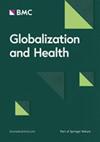实现可持续卫生发展的善治制度化:框架分析
IF 5.9
2区 医学
Q1 PUBLIC, ENVIRONMENTAL & OCCUPATIONAL HEALTH
引用次数: 0
摘要
本文从卫生系统治理和可持续发展的角度探讨了制度化的概念,即把想法转化为方案并使行动自动化的过程。制度化是建立负责任和透明的机构的关键机制,对于实现卫生系统的复原力和可持续性至关重要。本研究确定了卫生系统制度化的组成部分和层面,及其与良好治理和可持续卫生发展的关系。我们采用了范围审查法,分为五个步骤。首先,我们提出了研究问题。然后,我们在五个电子数据库中进行了全面的文献检索,以确定相关研究。本综述分为两个阶段:确定机构方法的概念及其在卫生系统中的组成部分,以及其与实现可持续卫生发展(SHD)的良好治理之间的关系。第三步是选择研究,由第一作者进行数据摘录。我们在审查中发现的关键问题涉及可持续健康发展的概念、其目标、支柱和原则;积极和平;善治;机构方法的组成部分及其关系。最后,我们以一个拟议概念框架的形式总结和组织了我们的研究结果,以巩固制度化在卫生系统实现可持续发展中的作用。制度化是实现积极和平与良好治理的一个关键概念,需要领导人、政治家、民间社会和公众的切实参与。制度化还取决于公正、人权、透明、问责和法治等条件。在 COVID-19 会议之后,制度化对于推进可持续发展比以往任何时候都更为重要,尤其是在中低收入国家(LMICs)的背景下。本文章由计算机程序翻译,如有差异,请以英文原文为准。
Institutionalization for good governance to reach sustainable health development: a framework analysis
This article explores the concept of institutionalization, which is the process of transforming ideas into programs and automating actions, in the context of health system governance and sustainable development. Institutionalization is a key mechanism for creating accountable and transparent institutions, which are essential for achieving health system resilience and sustainability. This study identifies the components and dimensions of institutionalization in the health system and its relationship with good governance and sustainable health development. We applied a scoping review method in five steps. First, we formulated a question for our research. Then, we concluded a comprehensive literature search in five electronic databases for identifying relevant studies. This review has two phases: identifying the concept of institutional approach and its components in health system, and its relationship with good governance to reach Sustainable Health Development (SHD). The third step was study selection, and the 1st author performed data abstraction. The key issues which are identified in our review, related to the concepts of SDH, its goals, pillars and principles; positive peace; good governance; components of institutional approach components, and their relations. Finally, we summarized and organized our findings in a format of a proposed conceptual framework, to underpin the role of institutionalization in the health system to achieve sustainable development. Institutionalization is a key concept for achieving positive peace and good governance, which requires meaningful involvement of leaders, politicians, civil society, and public participation. It also depends on the conditions of justice, human rights, transparency, accountability and rule of law. In the wake of COVID-19, institutionalization is more crucial than ever for advancing sustainable development, especially in the context of low and middle-income countries (LMICs).
求助全文
通过发布文献求助,成功后即可免费获取论文全文。
去求助
来源期刊

Globalization and Health
PUBLIC, ENVIRONMENTAL & OCCUPATIONAL HEALTH-
CiteScore
18.40
自引率
1.90%
发文量
93
期刊介绍:
"Globalization and Health" is a pioneering transdisciplinary journal dedicated to situating public health and well-being within the dynamic forces of global development. The journal is committed to publishing high-quality, original research that explores the impact of globalization processes on global public health. This includes examining how globalization influences health systems and the social, economic, commercial, and political determinants of health.
The journal welcomes contributions from various disciplines, including policy, health systems, political economy, international relations, and community perspectives. While single-country studies are accepted, they must emphasize global/globalization mechanisms and their relevance to global-level policy discourse and decision-making.
 求助内容:
求助内容: 应助结果提醒方式:
应助结果提醒方式:


